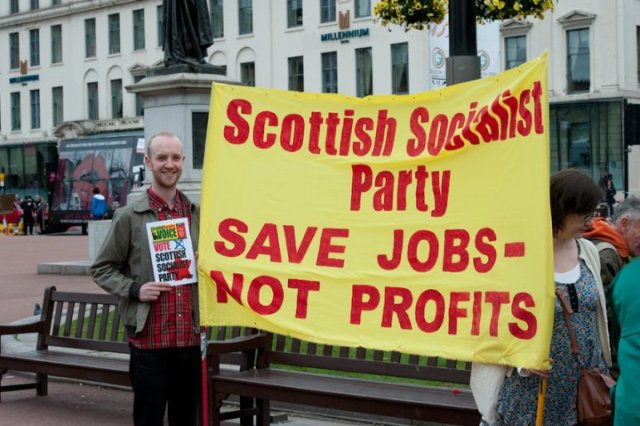
Did you hear the one about the election everyone lost? On May 6, Labour, the party in power, lost 100 seats and with it the chance to continue in government after 13 years. The Conservatives lost the victory all the polls had been promising them for the past 18 months.
The Liberals suffered perhaps the most devastating humiliation after Cleggmania turned out to be a complete and utter mirage. The man who apparently wowed us so much in the TV leadership debates actually lost a number of seats rather than gaining any.
The Scottish Nationalist Party also lost seats. Instead of going from seven to 20 as SNP leader Alex Salmond confidently predicted they actually went back to six.
Scottish Socialist Party (SSP) candidates lost all their deposits. We averaged around 1% of the votes cast, which was just as we expected, but the increase in Labour’s vote in Scotland was not anticipated!
Mind you, to all intents and purposes “Scotland is a foreign land” for Westminster elections. For one thing there was no swing to the Tories [Conservative Party] whatsoever. For another the TV leadership debates were largely irrelevant here since so much of what was discussed didn’t apply to us.
The Scottish Parliament at Holyrood retains responsibility for most of the things the Conservatives’ David Cameron, Labour’s Gordon Brown and the Liberal Democrats’ Nick Clegg argued over — health, education, criminal justice, transport.
The people who lost out most, however, were undoubtedly working people — as usual. The neoliberal, warmongering Westminster parties concocted a deal ahead of the election not to spell out what £100 billion of cuts in lifeline services looks like for working people.
They ignored the very real concerns of the unemployed — with unemployment at a 16-year high. They ignored the plight of the poor — with income inequality now wider than at any time since records began in 1961.
Since all three parties stand for the same thing there was no mention of the fact that 77% of working people are opposed to the ongoing occupation and slaughter in Afghanistan.
The overwhelming conclusion the 2010 general election pointed to in Scotland was the revulsion there is at the thought of a Tory government being returned. “Nice Boy Dave” Cameron has been rumbled.
With his odious remarks on cutting public services, immigration and withdrawing benefits from the jobless his mask slipped badly in the course of the campaign and his vile Thatcherite soul was exposed.
Tactical voting was employed across Scotland. The candidate most likely to stop a Tory win saw their votes rise. This was evident in Labour seats certainly, but also in SNP seats like Perth where Pete Wishart’s majority more than doubled as Labour voters opted for him as the optimum anti-Tory vehicle.
Chancellor Alastair Darling, the man at the helm during the worst economic collapse in 80 years, saw his majority over the Tories double in Edinburgh South West. This was the seat I contested on behalf of the SSP. To be honest I had anticipated the charge that standing against him might “let the Tories in” but it was never mentioned once.
Had it arisen I had a response prepared: “Which Tory did you mean like?”
We had a thoroughly enjoyable campaign with four weeks of active politicking, holding five public meetings in various parts of the constituency on our opposition to the cuts and the occupation of Afghanistan.
More than 30 new people signed up to join the party. More than 75,000 SSP election leaflets were delivered door to door.
Five hundred people packed into a church in Juniper Green to attend the “question time” arranged jointly by three local community councils. The SSP was widely regarded to have won the debate, however the audience were in the main “dyed in the wool Tories”.
The canvassing we conducted in Stenhouse provided us with very important intelligence about what people think of the SSP, our strengths and weaknesses. Chief among the criticisms were a sense that we are unrealistic about what we can achieve and we lack the strength to deliver on what we promise.
On the other hand voters we talked to were full of admiration for our commitment to working people and the interests of the poorest in society.
The SSP will continue campaigning against the economic injustice behind the cuts and the ongoing military repression in Afghanistan. These issues may have not been discussed much by the myopic media these past five weeks but they remain the most important features of politics in Scotland today.
[Colin Fox is Scottish Socialist Party co-spokesperson, former member of the Scottish Parliament for the Lothians. This article is abridged from his blog. Visit the Scottish Socialist Party’s website.]